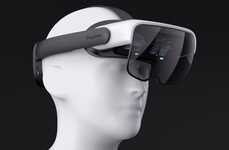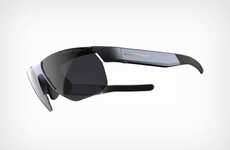
The Smart Cap Can Be Built Using Easily Available Parts
Rahul Kalvapalle — July 30, 2014 — Tech
References: diyhacking & techcrunch
The Smart Cap is an innovatively pieced together augmented reality headset developed by young Indian inventor Arvin Sanjeev. The Smart Cap is essentially a grittier Google Glass developed using Linux, an open source Raspberry-Pi computer and voice recognition software. By using easily available, off-the-shelf components, Sanjeev created this impressive augmented reality headset.
The Smart Cap is by no means the most impressive augmented reality headset around, nor is it intended to be. While there's no question that it's possible to put together a better functioning augmented reality headset, what's impressive about the Smart Cap is that it can be created by hand at very low cost and, thanks to its Raspberry Pi infrastructure, can function as a real wearable computer.
The Smart Cap is by no means the most impressive augmented reality headset around, nor is it intended to be. While there's no question that it's possible to put together a better functioning augmented reality headset, what's impressive about the Smart Cap is that it can be created by hand at very low cost and, thanks to its Raspberry Pi infrastructure, can function as a real wearable computer.
Trend Themes
1. Low-cost DIY AR Headsets - The trend towards creating augmented reality headsets using inexpensive and easily available components presents opportunities for DIY enthusiasts and hobbyists to experiment with AR technology.
2. Open-source AR - The growth of open-source development for AR software and hardware presents opportunities for collaborative innovation and accessibility to a wider range of innovative ideas.
3. Raspberry-pi-powered Wearable Computing - The trend towards creating wearable computing devices using Raspberry Pi and other open-source components presents opportunities for low-cost, customizable, and versatile devices that can be used in various industries.
Industry Implications
1. Education Technology - The development of low-cost DIY AR headsets can provide educators with the resources necessary to enhance their teaching methods and help students learn in more engaging ways.
2. Healthcare Technology - The use of open-source AR technology can revolutionize the healthcare industry by providing accurate, real-time information to medical professionals during surgery or diagnosis.
3. Manufacturing - Raspberry-Pi-powered wearable computing devices can be used in manufacturing to improve employee productivity, safety, and communication in the workplace.
1.7
Score
Popularity
Activity
Freshness















